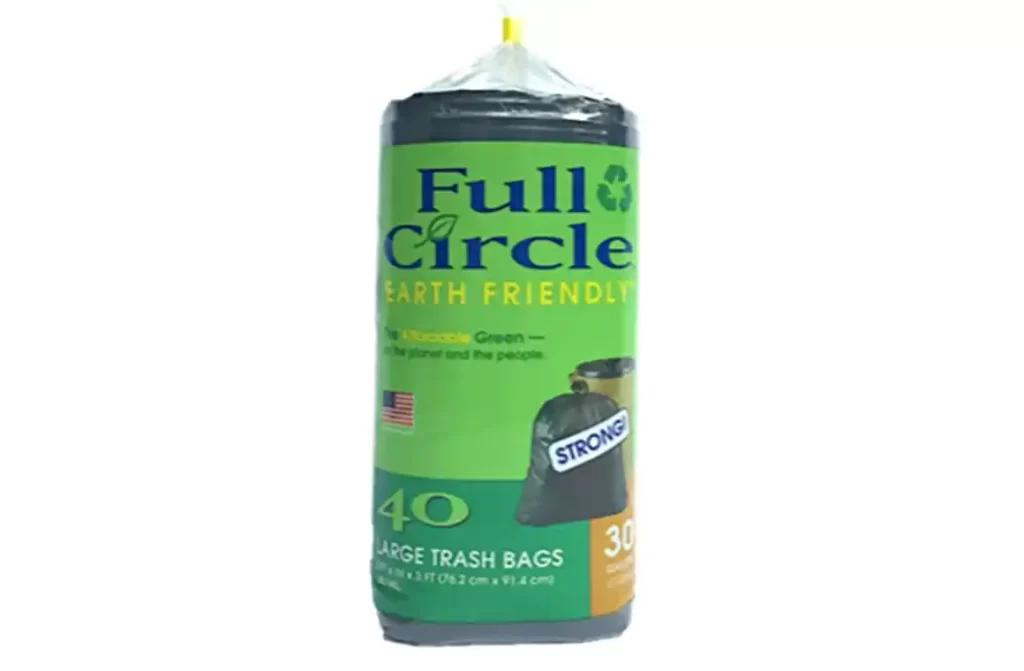Traditionally, overflowing landfills and plastic pollution have been a major concern. But what if there was a better way to manage your household waste? Biodegradable dustbin bags offer a surprisingly effective solution.
Made from plant-based materials, these innovative bags break down naturally, reducing landfill waste and environmental impact. Intrigued?
Let’s explore 7 surprising benefits of making the switch to biodegradable dustbin bags!
What is a Biodegradable Dustbin Bag?
Biodegradable dustbin bags are eco-friendly alternatives designed to decompose naturally over time, unlike traditional plastic bags.
Made from organic materials such as cornstarch or plant-based polymers, they break down into harmless substances when exposed to environmental conditions.
These bags serve the same purpose as conventional plastic bags but with a significantly reduced environmental footprint.
By choosing biodegradable options, individuals contribute to waste reduction and help combat plastic pollution.
7 Untapped Benefits of Biodegradable Dustbin Bags
Now that we understand the essence of biodegradable dustbin bags, let’s unveil the hidden advantages they offer.
Beyond their eco-friendly composition, these innovative bags hold a myriad of benefits that often go unnoticed.
Join us as we uncover seven remarkable benefits that make biodegradable dustbin bags a game-changer in waste management and environmental conservation.
Benefit #1 Reduced Landfill Waste
Biodegradable dustbin bags play a crucial role in mitigating the burden on landfills.
Landfills are overflowing! Traditional plastic bags can take hundreds of years to break down, contributing significantly to this growing problem.
This decomposition process significantly reduces the volume of waste occupying landfills, easing the strain on our limited landfill capacity.
A 2017 study by Science Advances revealed that plastic waste generation has reached a staggering 8.3 billion metric tons, with only 9% recycled.
Biodegradable bags can significantly reduce this burden on landfills, promoting a cleaner and healthier planet.
Benefit #2 Minimized Microplastics
Biodegradable dustbin bags help combat the pervasive issue of microplastic pollution.
Traditional plastic bags gradually break down into tiny particles known as microplastics, which infiltrate ecosystems and pose significant environmental threats.
Did you know that 97% of Antarctic seabirds have ingested Microplastic? More details here.
In contrast, biodegradable bags decompose into natural components, eliminating the risk of microplastic contamination.
Studies estimate around 350 millions of tons of plastic enter the ocean each year.
By choosing biodegradable dustbin bags, individuals contribute to the preservation of aquatic environments and protect the planet from the harmful effects of microplastics.
Benefit #3 Reduced Risk of Animal Harm
Animals often mistake plastic bags for food, leading to tragic consequences.
For instance, sea turtles, for instance, can confuse plastic bags with jellyfish, a common prey item.
Ingesting plastic can cause blockages, starvation, and even death. Biodegradable dustbin bags decompose naturally, posing less of a threat to wildlife.
Biodegradable dustbin bags offer a safer alternative for wildlife and marine animals as biodegradable bags break down into natural elements, reducing the risk of harm to animals.
Thus biodegradable dustbin bags contribute to wildlife conservation efforts and protect vulnerable species from unnecessary harm.
Benefit #4 Potentially Lower Long-Term Costs
While the initial purchase cost of biodegradable bags may be slightly higher than traditional plastic bags, the potential for lower long-term expenses is undeniable.
As biodegradable waste management practices become more widespread, disposal fees for these bags may decrease.
Sustainable and reusable bags contribute to reduced waste management costs by minimizing landfill usage and streamlining waste disposal processes.
In the long run, choosing biodegradable options can contribute to cost savings and a greener future for waste management.
Benefit #5 Promotes a Sense of Environmental Responsibility
Using biodegradable dustbin bags fosters a culture of environmental stewardship and responsibility.
By consciously choosing eco-friendly alternatives, individuals demonstrate their commitment to preserving the planet for future generations.
Biodegradable bags serve as tangible symbols of environmental consciousness, inspiring others to adopt sustainable practices.
Research has shown that communities with widespread use of biodegradable products experience a notable increase in environmental awareness and engagement in conservation efforts.
By promoting a sense of environmental responsibility, biodegradable dustbin bags empower individuals to make positive contributions towards a more sustainable world.
Benefit #6 Reduced Reliance on Fossil Fuels
Our reliance on fossil fuels for traditional plastic production is a pressing concern.
Biodegradable dustbin bags offer a surprising benefit: reduced dependence on these resources.
Many biodegradable options are derived from plant-based materials, lessening the need for fossil fuels in the production process.
A 2020 study by the American Chemical Society estimates that plastic production gobbles up about 8% of the world’s oil supply. While some studies suggest that it accounts for 10% of global oil production.
Thus by opting for biodegradable alternatives like biodegradable garbage bags, we can contribute to a more sustainable future and a lighter footprint on our planet’s resources.
Benefit #7 Contributes to a Circular Economy
Biodegradable garbage bags bags play a crucial role in transitioning towards a circular economy model.
Unlike the linear “take-make-dispose” approach of traditional plastic bags, biodegradable alternatives support a circular system where resources are kept in use for as long as possible.
Biodegradable bags can be composted or recycled, closing the loop and minimizing waste.
By embracing biodegradable options, individuals contribute to the creation of a sustainable economy where materials are reused, recycled, or returned to the environment without causing harm.
Adopting biodegradable dustbin bags is a step towards building a circular economy that prioritizes resource efficiency and environmental sustainability.
Bonus: Supports Sustainable Waste Management Practices
In addition to the primary benefits, biodegradable dustbin bags support sustainable waste management practices.
These bags facilitate the adoption of composting and recycling initiatives, diverting organic waste from landfills.
Composting biodegradable bags along with organic waste helps produce nutrient-rich compost for soil enrichment.
Furthermore, recycling facilities can process biodegradable bags into new products, extending their lifespan and reducing the need for virgin materials.
By supporting sustainable waste management practices, reusable dustbin bags contribute to a more efficient and environmentally friendly approach to waste disposal.
You May Also Read: Biodegradable Garbage Bags: Your Ultimate Guide
Conclusion
In conclusion, the journey through the seven unknown benefits of biodegradable dustbin bags has shed light on the remarkable advantages of these eco-friendly alternatives.
From reducing landfill waste and minimizing microplastics to safeguarding wildlife and promoting environmental responsibility, biodegradable bags offer multifaceted solutions to pressing environmental challenges.
Moreover, their potential for lower long-term costs, reduced reliance on fossil fuels, and contribution to a circular economy further underscore their importance in sustainable waste management.
Thus by opting to biodegradable garbage bags, individuals can make a tangible impact on the planet and pave the way towards a greener, more sustainable future for generations to come.
It’s time to take action and make the switch to biodegradable options for a cleaner, healthier planet. Every small action counts.

